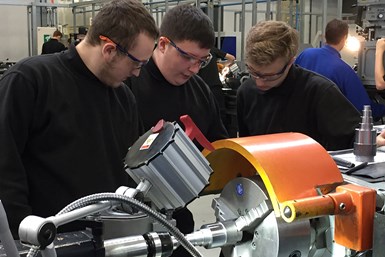Strengthening Manufacturing Workplaces Through Active Listening
A good strategy to weather the storms of manufacturing market upheavals and unpredictable factors is to commit to continuous, active employee listening.
#columns #workforcedevelopment

Proactively listening to employee thoughts, ideas and concerns enables manufacturing organizations to greatly improve their operational efficiency and avoid reacting to problems retrospectively. (Photo credit: PMPA)
As recent economic indicators suggest a positive outlook, industries continue to grapple with high turnover rates and potential supply chain disturbances. With these ongoing challenges and persistent raw material cost issues, manufacturing industry leaders are pivoting to new strategies to enhance operational efficiency and maintain a competent, dedicated workforce.
In the midst of market upheavals and unpredictable factors, one area within leaders’ control is building resilient relationships with frontline employees. The most potent strategy to weather these storms collectively is to commit to continuous, active employee listening. This approach keeps leaders in touch with their employees’ experiences, ideas and apprehensions.
Featured Content
Frontline manufacturing employees often face challenges stemming from their work environment and feel they don’t have adequate opportunities to provide impactful feedback for workplace improvement. Given that only half of these essential workers feel they have a say in workplace decision-making, unresolved issues such as safety concerns, career advancement opportunities and work-life balance struggles can damage the organization’s financial health.
Establishing a two-way communication channel with employees is pivotal in today’s workplace dynamics.
Employers can collect vital insights to enhance and optimize operations by utilizing employee feedback. Establishing a two-way communication channel with employees is pivotal in today’s workplace dynamics. This open dialogue nurtures an employer/employee relationship in which information flows freely in both directions, enabling employees to feel valued and heard, thereby boosting job satisfaction. An empowered and engaged workforce results in improved productivity, reduced turnover, enhanced customer loyalty and a transformed workplace culture.
To cultivate a gratifying and efficient work environment, business leaders in manufacturing must navigate three pivotal hurdles which are often at the root of employee discontentment and feelings of underappreciation. These include:
- Transparency gap. In the face of fluctuating economic conditions, manufacturers might resort to cost-cutting measures to secure financial stability. However, a problem arises when these pivotal decisions occur without employee involvement or clarity about their reasoning. This lack of transparency can leave frontline employees feeling sidelined and undervalued, creating a domino effect that can tarnish productivity, customer loyalty, company reputation and employer-employee relationships. A study from Washington State University corroborates this, revealing that employees report diminished job satisfaction and lessened employer loyalty for up to two years following significant cost-cutting events, further leading to decreased productivity and increased turnover rates. To alleviate this, it’s vital for companies to maintain open communication, recognizing the necessity for changes and demonstrating that the consequences for their employees have been contemplated.
- Safety oversights. Safety is paramount in any industry, but it holds particular importance in the manufacturing sector. Unfortunately, it often gets overlooked, as an OSHA report highlights the high incidence of work-related injuries in this industry. In 2021, the U.S. manufacturing industry experienced more than 4,000 preventable injury-related deaths and an additional 381,100 nonfatal injuries. The lack of channels to report safety issues and fear of backlash often lead to these concerns being neglected. To ensure workers’ safety and maintain productivity, it is crucial to establish clear channels for reporting safety concerns and enforcing strict adherence to safety protocols.
- Misaligned career prospects. One key aspect influencing employee retention is the prospect of career advancement. Unfortunately, a stark difference often exists between the career progression opportunities presented during recruitment and the actual scenarios once on the job. This disparity can lead to disenchantment and disengagement among employees. Companies should aim to bridge this gap by aligning their recruitment promises with actual job roles and opportunities. Moreover, they need to realize that career development isn’t limited to promotions. It can also mean comprehensive training programs, further education options and tuition reimbursement.
A common thread weaving through these challenges is an opportunity for leadership to actively listen to their frontline employees to identify concerns before they snowball out of control. Proactively listening to employee thoughts, ideas and concerns enables manufacturing organizations to greatly improve their operational efficiency and avoid reacting to problems retrospectively.
Active listening within the workplace fosters a culture that encourages growth, respect and job satisfaction. Establishing communication channels that amplify individual voices within the manufacturing workforce enables organizations to gather real-time insights, solving short-term operational and long-term cultural issues.
About the Author
Max Farrell
Max Farrell is the co-founder and CEO of WorkHound, a company committed to giving a voice to frontline employees through a real-time, anonymous feedback platform. WorkHound empowers thousands of employees with a platform that captures anonymous feedback every week, offering real-time actionable insights and helping leadership teams to foster communication, drive company culture and, ultimately, build better workplaces.
RELATED CONTENT
-
Production Machining’s April 2023 News Highlights
Production Machining’s April 2023 news highlights include a special honor for a GBM stalwart, reshoring news, new technician training, workforce development funding and more.
-
Dealing With Workplace Dysfunction
Do you manage a toxic work culture? Learn the signs and how to address and overcome these problems quickly to clear the path for a happier and more productive workplace.
-
Applying a Healthy Approach to Employee Investment
Service Center Metals’ on-site health center offers its employees and their families free same-day health care and, in return, the employer is gaining many benefits including a healthier workforce and attracting potential employees.






